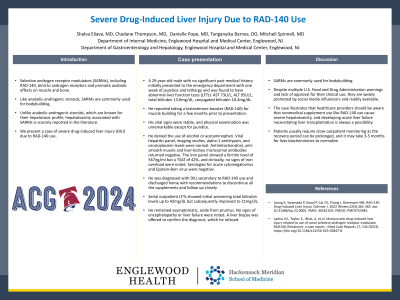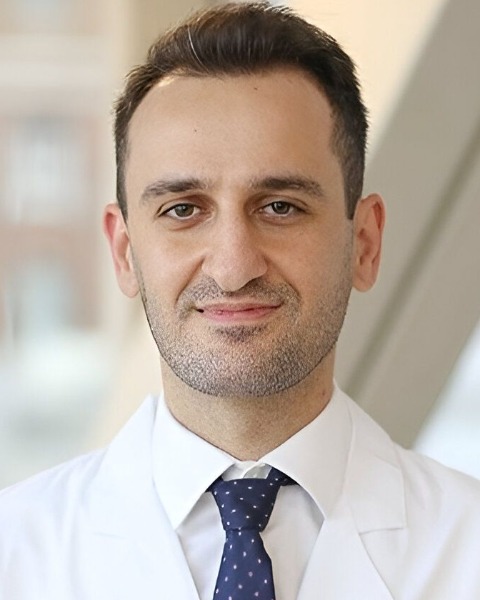Monday Poster Session
Category: Liver
P3098 - Severe Drug-Induced Liver Injury Due to RAD-140 Use
Monday, October 28, 2024
10:30 AM - 4:00 PM ET
Location: Exhibit Hall E

Has Audio

Shalva Eliava, MD
Englewood Hospital and Medical Center
Englewood, NJ
Presenting Author(s)
Shalva Eliava, MD1, Chadane Thompson, MD1, Danielle Pope, MD2, Tanganyika Barnes, DO1, Mitchell Spinnell, MD1
1Englewood Hospital and Medical Center, Englewood, NJ; 2Englewood Hospital and Medical Center, Bogota, NJ
Introduction: Selective androgen receptor modulators (SARMs), including RAD-140, bind to androgen receptors and promote anabolic effects on muscle and bone. Like anabolic-androgenic steroids, SARMs are commonly used for bodybuilding. Unlike anabolic-androgenic steroids, which are known for their hepatotoxic profile, hepatotoxicity associated with SARMs is scarcely reported in the literature. We present a case of severe drug-induced liver injury (DILI) due to RAD-140 use.
Case Description/Methods: A 29-year-old male with no significant past medical history initially presented to the emergency department with one week of jaundice and lethargy and was found to have abnormal liver function tests (LFTs): AST 73U/L, ALT 95U/L, total bilirubin 13.6mg/dL, conjugated bilirubin 10.4mg/dL. He reported taking a testosterone booster (RAD-140) for muscle building for a few months prior to presentation. His vital signs were stable, and physical examination was unremarkable except for jaundice. He denied the use of alcohol or acetaminophen. Viral hepatitis panel, imaging studies, alpha-1-antitrypsin, and ceruloplasmin levels were normal. Antimitochondrial, anti-smooth muscle and liver-kidney microsomal antibodies returned negative. The iron panel showed a ferritin level of 567ng/ml but a TSAT of 42%, and clinically, no signs of iron overload were noted. Serologies for acute cytomegalovirus and Epstein-Barr virus were negative. He was diagnosed with DILI secondary to RAD-140 use and discharged home with recommendations to discontinue all the supplements and follow up closely.
Serial outpatient LFTs showed initial worsening total bilirubin levels up to 42mg/dL but subsequently improved to 21mg/dL. He remained asymptomatic, aside from pruritus. No signs of encephalopathy or liver failure were noted. A liver biopsy was offered to confirm the diagnosis, which he refused.
Discussion: SARMs are commonly used for bodybuilding. Despite multiple U.S. Food and Drug Administration warnings and lack of approval for their clinical use, they are widely promoted by social media influencers and readily available.
The case illustrates that healthcare providers should be aware that nonmedical supplement use like RAD-140 can cause severe hepatotoxicity, and developing acute liver failure necessitating liver transplantation is always a possibility. Patients usually require close outpatient monitoring as the recovery period can be prolonged, and it may take 3-5 months for liver biochemistries to normalize.
Disclosures:
Shalva Eliava, MD1, Chadane Thompson, MD1, Danielle Pope, MD2, Tanganyika Barnes, DO1, Mitchell Spinnell, MD1. P3098 - Severe Drug-Induced Liver Injury Due to RAD-140 Use, ACG 2024 Annual Scientific Meeting Abstracts. Philadelphia, PA: American College of Gastroenterology.
1Englewood Hospital and Medical Center, Englewood, NJ; 2Englewood Hospital and Medical Center, Bogota, NJ
Introduction: Selective androgen receptor modulators (SARMs), including RAD-140, bind to androgen receptors and promote anabolic effects on muscle and bone. Like anabolic-androgenic steroids, SARMs are commonly used for bodybuilding. Unlike anabolic-androgenic steroids, which are known for their hepatotoxic profile, hepatotoxicity associated with SARMs is scarcely reported in the literature. We present a case of severe drug-induced liver injury (DILI) due to RAD-140 use.
Case Description/Methods: A 29-year-old male with no significant past medical history initially presented to the emergency department with one week of jaundice and lethargy and was found to have abnormal liver function tests (LFTs): AST 73U/L, ALT 95U/L, total bilirubin 13.6mg/dL, conjugated bilirubin 10.4mg/dL. He reported taking a testosterone booster (RAD-140) for muscle building for a few months prior to presentation. His vital signs were stable, and physical examination was unremarkable except for jaundice. He denied the use of alcohol or acetaminophen. Viral hepatitis panel, imaging studies, alpha-1-antitrypsin, and ceruloplasmin levels were normal. Antimitochondrial, anti-smooth muscle and liver-kidney microsomal antibodies returned negative. The iron panel showed a ferritin level of 567ng/ml but a TSAT of 42%, and clinically, no signs of iron overload were noted. Serologies for acute cytomegalovirus and Epstein-Barr virus were negative. He was diagnosed with DILI secondary to RAD-140 use and discharged home with recommendations to discontinue all the supplements and follow up closely.
Serial outpatient LFTs showed initial worsening total bilirubin levels up to 42mg/dL but subsequently improved to 21mg/dL. He remained asymptomatic, aside from pruritus. No signs of encephalopathy or liver failure were noted. A liver biopsy was offered to confirm the diagnosis, which he refused.
Discussion: SARMs are commonly used for bodybuilding. Despite multiple U.S. Food and Drug Administration warnings and lack of approval for their clinical use, they are widely promoted by social media influencers and readily available.
The case illustrates that healthcare providers should be aware that nonmedical supplement use like RAD-140 can cause severe hepatotoxicity, and developing acute liver failure necessitating liver transplantation is always a possibility. Patients usually require close outpatient monitoring as the recovery period can be prolonged, and it may take 3-5 months for liver biochemistries to normalize.
Disclosures:
Shalva Eliava indicated no relevant financial relationships.
Chadane Thompson indicated no relevant financial relationships.
Danielle Pope indicated no relevant financial relationships.
Tanganyika Barnes indicated no relevant financial relationships.
Mitchell Spinnell indicated no relevant financial relationships.
Shalva Eliava, MD1, Chadane Thompson, MD1, Danielle Pope, MD2, Tanganyika Barnes, DO1, Mitchell Spinnell, MD1. P3098 - Severe Drug-Induced Liver Injury Due to RAD-140 Use, ACG 2024 Annual Scientific Meeting Abstracts. Philadelphia, PA: American College of Gastroenterology.
